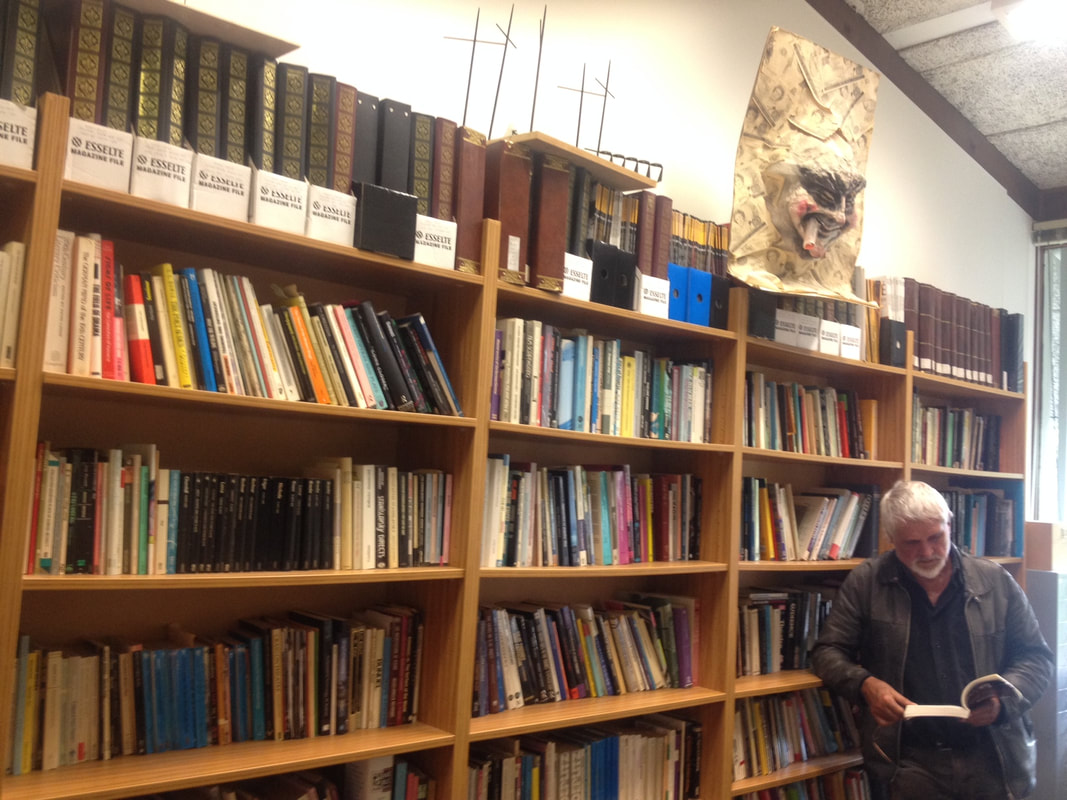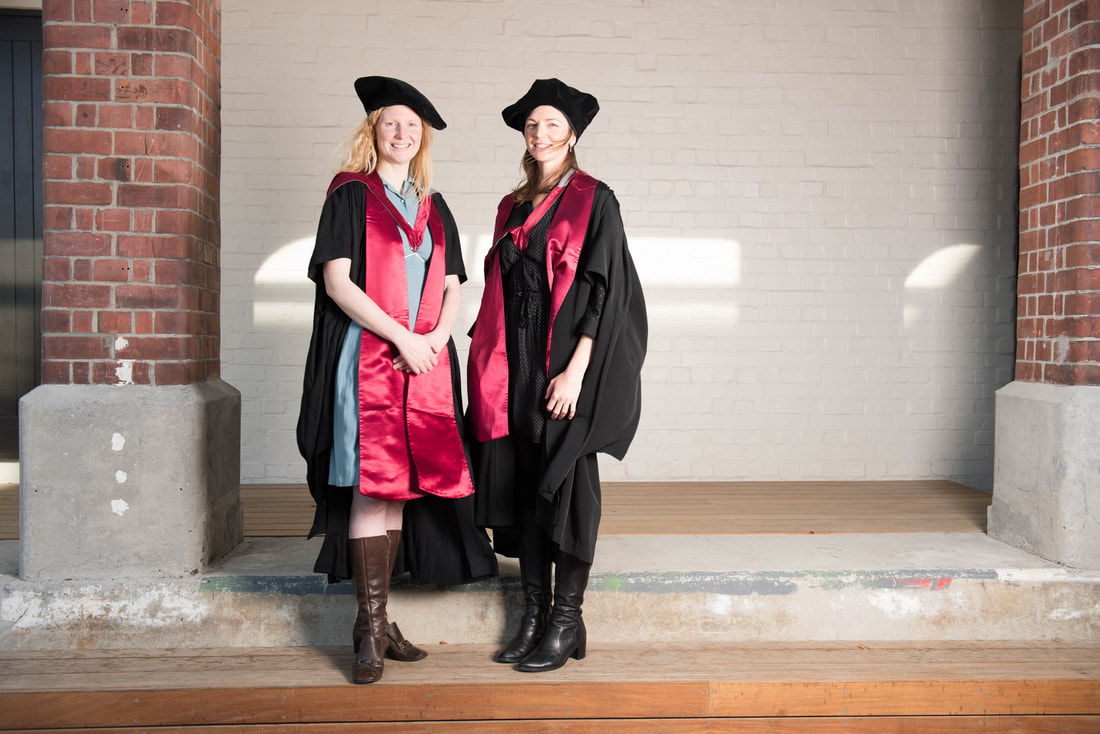|
Over the last month, the significant performance library at UC of Free Theatre's Peter Falkenberg has been packed up and moved to the Arts Centre to form a new library in The Gym. The move prompted reflection on some remarkable achievements since the Theatre and Film Studies Department was "disestablished" in 2013. It's a funny old thing... Since the axe fell, this 'non-department' has produced six PhDs. That would be impressive for any department of its kind anywhere - let alone one that doesn't officially exist... having been sacrificed on the altar of STEM (Science, Tech, Engineering and Maths - the subjects pushed by the last government as the most relevant for employment and productivity with the arts being seen as the most "irrelevant"). Marian McCurdy, Emma Johnston, Te Rita Papesch, Tony McCaffrey, Aaron Annan and, just recently, Liz Boldt, have reached the pinnacle of academic study. With supervision from Peter Falkenberg and Sharon Mazer, post-graduate work has been produced that would be impressive anywhere but outrageously successful for a department that achieved such a sophisticated bridging of theory and practice. Ironically, a US academic's review of the department that was eventually used to close it down stated unequivocally that such an impressive culture would be the "jewel in the crown of any serious research university in the US". It's critical, political approach clearly made it a target not simply collateral damage as some have claimed. This is a hallmark of neoliberalism. Our resistance needed to be dealt to, publicly. The submitted work of PhDs reflects the rich, diverse and nuanced culture that has grown out of Free Theatre and adds to an impressive culture over 20 years - topics here. There is one PhD still to come. And of course Free Theatre with a core of PhDs at its heart continues to produce new work in the central city with a mix of vastly experienced and qualified artists and emerging young artists that may well go on to produce a new wave of practice and theory that drives a new culture. It feels like there is change coming. An article in The Press recently ['Free fees and changing degrees: The changing face of higher education' Philip Matthews 05:00, Dec 16 2017] acknowledged the destruction of nine years of neoliberal governance on education and the arts in particular and an awareness of the desperate need for the analytical, contextual approach of arts education in what will be a vastly different society and economy in the 21st century: There is a certain 'follow the money' culture that has been promoted over the past decade that has narrowed some of the wider debate around the overall value of participating in education... It's not just a private good, it's a public good. We need to rediscover that ethos... A university education is not just about making yourself more employable. If you talk to employers about the skills and dispositions they want a graduate to have, they want critical thinkers, people who can digest large volumes of information and make sense of it, who can be analytical. They are talking about the profile of a graduate across a huge breadth of programmes. I think we go down a very dangerous path if we say that a university degree is preparation for a particular job. We know that university graduates tend to be pretty adaptable and flexible. It must be said that the targeting of the arts by Steven "Pretty Legal" Joyce and his previous National government were draconian and predicated on a misguided, outdated world view. However, it continues to be a sign of hope that there are those who acknowledge this and have fought for a less "flat-earth" approach within the university: Around the country, for arts in particular, this last decade has been demoralising. Every year we get told 'You're not as useful and don't contribute as much', even though we see all around us the important role arts has played in Christchurch's recovery. At least now we have a Minister for the Arts at the highest level in Government, showing once again what the Prime Minister takes seriously. A recent piece from UC senior management ['A city and its university: Is UC ready to be a creative force in Christchurch's future?' John McCrone05:00, Feb 03 2018] seemed an attempt to rewrite history and reposition management as saviours of the university rather than henchmen for the previous neoliberal regime. But the attempted spin and assertions simply don't stand up to even brief scrutiny. In 2012, a colleague at UC described "TAFS people" as cockroaches - as the university looked to once again shut us down (eventually with success). He offered a back-handed mark of respect by using the same term that then US Secretary of State Hilary Clinton used to describe former PM Helen Clark (who, incidentally, once saved the department) as the ultimate survivor. But our erstwhile colleague was pointing towards something that perhaps just doesn't make sense in university these days... or arts organisations... Free Theatre and the department it spawned just don't make sense in a market-driven culture, continuing to function as a critic and conscience against the commercial odds. It is this kind of focus on collective creative thinking that is the future. As a new Minister for the Arts, who just happens to be the PM, steps up, she brings with her an unprecedented two Associate Ministers for the Arts that are, respectively, the Minister for Finance (and Sport) and the Minister for Social Development and Disability issues. For those that care, we all have to contribute to make sure this symbolism marks real change and not more of the same neoliberal posturing. With that in mind, it may be of interest to read Falkenberg's keynote for a conference on 'theatre and resilience' in Australia last year. Among other things, the article reflects on the experience of the department, Free Theatre and Christchurch as they battled through the worst excesses of neoliberalism that were pushed to extremes by the National government of the last nine years. People want to be reassured by performances of resilience. Looking at it in this light, resilience becomes problematic. It could be that the arts and theatre can become complicit with the ruling ideology, and will become service providers like the counsellors and psychologists who are employed after a catastrophe. Only good news is allowed. This is an old predicament for those of us who make theatre. We always have to decide if we want to become part of an entertainment industry, or if we consider art-making in the theatre as part of a larger emancipatory process. Schiller says that only where we play can we be free and fully human. If we are not free, how can we play? Perhaps we have to think about replacing resilience with another word: resistance.
0 Comments
|
Free Theatre ChChFree Theatre Christchurch. Intermittent blogging. Thoughts. Enjoy. Archives
March 2021
Categories |
- HOME
- ABOUT
- UPCOMING
- EDUCATION
-
ARCHIVE
-
Productions 1979 - present
>
- Babylon Berlin
- Beggars Banquet
- Woyzeck
- The Tempest
- The Axe
- Endgame
- Digitising Performance
- Erewhon: Over the Range
- A Summer Night's Dream
- How Dare You
- A Winter's Tale
-
Ubu Nights
>
-
Past Ubu Nights
>
- Ma Ubu Night
- Ubu Through the Looking Glass
- Ubu in Wonderland Ubu Night
- Frankenstein Ubu Night
- Casablanca Ubu Night
- Faust Ubu Night
- Not Hamlet Ubu Night
- Punk Ubu Night
- The Art of the Deal Ubu Night
- Crossroads Ubu Night
- Ubu Shows Us the Way to Brecht's Whiskey Bar
- The Devil and the Blues Ubu Night
- Bowie Ubu Night
- Warhol Ubu Night
- Berlin Kabarette
- Beat Ubu Night
- Twin Peaks Ubu Night
- David Lynch Ubu Night
- Kafka Ubu Night
- Tango Ubu Night
- Ubu Ubu Night
- Lovecraft Ubu Night
-
Past Ubu Nights
>
- Ars Acustica
- Alice
- The Black Rider
- Frankenstein
- The Mauricio Kagel Project
- Te Puna Toi 2015: Footprints/Tapuwae
- Kafka's Amerika
- The Soldier's Tale
- Canterbury Tales
- I Sing the Body Electric
- Hereafter
- Passion, Pulse and Power
- The Earthquake in Chile
- Doctor Faustus
- The Marvellous Corricks >
- Distraction Camp
- Remake
- Ella and Susn
- Free Theatre - 25 years and counting...
- Faust Chroma
- Enigma Emmy Goering/Nico Sphinx of Ice
- Faust Feast
- Diana Down Under
- Philoctetes >
- Fantasia
- Christmas Shopping
- Grimm's Sleeping Beauty
- Achternbusch in the Antipodes
- Caucasian Chalk Circle
- Samson Airline
- Kabarett Kabul
- Footprints/Tapuwae
- Last Days of Mankind
- Medea
- Bakkhai / Diotek
- Krapp's Last Tape
- Murderer Hope of Women / The Philosopher's Stone
- Comrade Savage
- Love on a Bicycle
- Resolution Island
- Songs for the Judges
- Crusoe
- Oedipus Rex/Oedipus at Colonus
- States of Shock
- Empire Builders
- Yes
- Power
- Robinson Crusoe: Or I THat Was Born To Be My Own Destroyer
- Newsbites
- Dumped in Space
- MedeaMaterial
- Salome
- Electra
- Sphinx and Strawmen
- The Girl Who Sings Waterfalls
- Hamletmachine
- Oresteia
- A Respectable Wedding
- Bitter Tears of Petra von Kant
- Double Act and Postponeless
- Cloudkiwiland
- Preversions
- G.O.P. Helpomatic
- The Mortal Pleasure of Wander Lust
- Red Cross & Takeaway
- Lulu Earth Spirit
- The Meeting
- Action / Tongues
- Cowboy Mouth
- The Rise and Fall of the City of Mahagonny
- A Letter from L
- Dinosaurs and All the Rubbish / The Hunting of the Snark
- The Ride Across Lake Constance
- Electra
- In Three Minds
- The Rapist Over Suzannah
- 1984: The Future Is Now
- Leonce and Lena
- Kabernette
- The Joffongract
- My Foot, My Tutor
- King Lear
- King Ubu
- Jazz Cellar Dada / Heavy Metal Cabaret
- Kabarett
- Black Cat Cabaret
- The Gas Heart/Ox on the Roof/The Mirror Wardrobe One Fine Evening
- Round Dance
- Woyzeck
- Make-up Ground down / Texts for Decomposition
- Court Case: Arts Centre vs Free Theatre
- Image Gallery 1979 - present
- TV3 Clips
- Selected Reviews
-
Productions 1979 - present
>
- Te Puna Toi
- SUPPORT
- BLOG



 RSS Feed
RSS Feed

